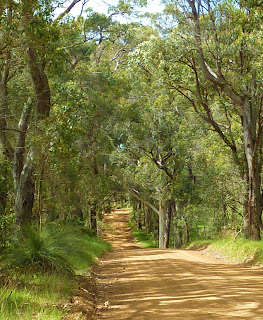Our destination today was Cape le Grand, which is reputed to have some of the best beaches in Australia, of not the world.
As we left the caravan park, we had to stop at a railway crossing where a train, pulling trucks of iron ore, was passing through. It was long & took quite a time to pass by, though nothing to compare with those we'd seen in Port Hedland.
We drove through some eucalypt forests where the smell of the oil pervaded the car - fortunately, I love it!
About 50-60km from the town, we arrived at the Cape le Grand National Park, where large peaks dominated the horizon & pure white sand showed through the vegetation. We stopped to photograph Frenchman Peak & noticed some exquisite little pink flowers that were shaped rather like miniature orchids, but were actually Trigger Plants. This was wild & rugged country, reminiscent of Dartmoor & Exmoor, in England. However, the plant life was somewhat different. An amazing variety of wildflowers grew in amongst the bushes - a paradise for bees & honeyeaters.
 |
| Frenchman Peak |
Thistle Cove was as white as snow but, unfortunately the sky had clouded over & the sea didn't have the depth of colour that we enjoyed yesterday, when the water sparkled! However, "patience is a virtue" &, as we waited, the sun came out & the scenery responded favourably.
 |
| Thistle Cove |
In Lucky Bay, we were amazed to see kangaroos hopping around on the beach & even lounging on the sand. Some had attached themselves to a group of people who were fishing, probably hoping for some titbits of fruit or salad.
The white sand was of a strange consistency - in fact, it became exactly like plaster when wet, being ultra-fine & glutinous if mixed with water. A couple of youngsters were finding it almost impossible to make sandcastles.
For the first time, flies were a problem & we found it necessary to eat our lunch in the car - Paradise comes at a price!
Apparently, Cape le Grand is Esperance's top tourist attraction & one can understand why - its stunning beauty would impress all who saw it. However, its distance from large centres of population is probably its salvation - long may this happy situation continue; it would be a sin to commercialize it.


















